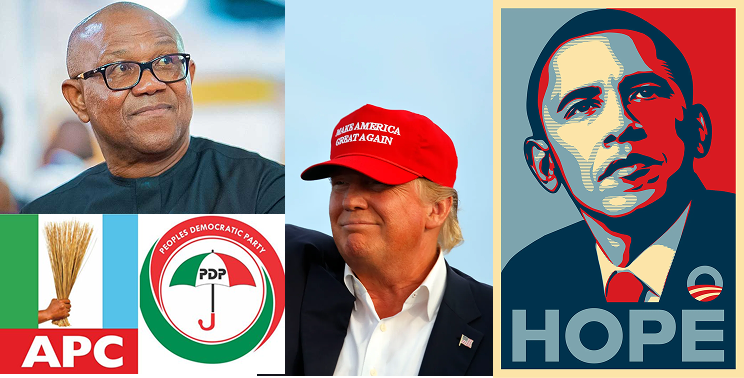Politics might seem worlds apart from the creative work we do at our agency, but look closer, and you’ll see it’s actually the ultimate branding masterclass. When billions of dollars and the fate of entire nations depend on how voters perceive a candidate, the stakes for effective branding couldn’t be higher.
Why Political Branding Matters More Than You Think
Think about it—what sets a winning candidate apart from a losing one? Often, it’s not just policy but perception. It’s how well they package their message into something voters can instantly recognize, understand, and connect with emotionally.
This is branding in its purest form.
America’s Branding Playbook: Big Money, Big Impact
The U.S. has long set the standard for modern political branding. Campaigns invest heavily in visual identity, messaging, and digital engagement to shape public perception.
Take Barack Obama’s 2008 “Hope” campaign. The iconic Shepard Fairey poster wasn’t just an artistic statement—it became a symbol of optimism and change. What made it truly effective was its emotional connection with voters, supported by a strong digital strategy that helped raise record-breaking campaign funds.
Donald Trump’s “Make America Great Again” slogan, on the other hand, became one of the most recognizable political brands of the digital age. The red cap turned into a cultural icon, and his campaign mastered digital engagement by running millions of targeted social media ads, ensuring the message reached the right voters.
Nigerian Politics: Where Symbols Speak Volumes
Nigeria’s political space presents unique branding challenges—over 250 ethnic groups, multiple languages, and a predominantly young population. This makes symbolic communication even more crucial.
A prime example is the APC’s 2015 “Change” campaign. The party’s broom symbol carried a strong message of unity and a promise to “sweep away” corruption, which resonated with many voters. The campaign played a key role in the historic victory that saw an opposition party unseat an incumbent president for the first time in Nigeria’s history.
Similarly, The PDP’s umbrella symbol, once a strong political identifier, faced challenges over time as public perception shifted. In the 2023 election, Atiku Abubakar’s ‘Recover Nigeria’ slogan struggled to gain widespread traction, highlighting the difficulties of rebranding in the face of evolving voter sentiment and trust dynamics.
A brand is no longer what we tell the consumer it is, it is what consumers tell each other it is.
— Scott Cook
The Digital Battlefield: How Social Media Shaped Nigeria’s 2023 Election
The 2023 Nigerian election demonstrated the growing power of digital branding, especially among the youth, who make up a significant portion of the electorate.
Tinubu’s ‘Renewed Hope’ campaign echoed MKO Abiola’s famous ‘Hope ‘93’ slogan, leveraging nostalgia as a branding tool. His campaign maintained visibility through billboards, grassroots outreach, and digital messaging. However, the 2023 election itself sparked significant debate, with discussions often centered on the electoral process rather than campaign branding alone.
On the other hand, Peter Obi’s “Obidient” movement took a grassroots approach, using crowdfunding and minimalist branding that fostered a sense of community. His social media following surged significantly in the months leading up to the election, reflecting growing digital engagement in Nigerian politics.
What This Means for Brands
Whether you’re selling shawarma or running for office, the lessons are clear:
- Symbols matter. From Obama’s “O” logo to APC’s broom, simple visuals help complex messages spread faster.
- Cultural relevance beats polish. In Nigeria, successful campaigns tap into cultural sentiment rather than relying solely on aesthetic appeal.
- Digital presence is non-negotiable. With Nigeria’s internet penetration continuing to grow, social media has become the primary battleground for engagement.
- Authenticity can’t be faked. Once trust is broken, rebranding alone isn’t enough to regain credibility.
All political power is trust.
— Charles James Fox
The Double-Edged Sword of Political Branding
Of course, political branding isn’t just about crafting the perfect message—it also raises ethical questions. Misinformation, AI-generated content, and emotional manipulation can blur the lines between persuasion and deception. The last election, for example, saw digitally altered campaign materials circulating online, illustrating the risks of unchecked branding tactics.
What’s Next?
As creative professionals, we can learn from political campaigns while avoiding their pitfalls. The most effective branding—whether for politicians or products—combines compelling visuals with genuine value.
So, next time you’re developing a brand strategy, ask yourself:
“Would this win an election?”
Because if it can win hearts and minds at the ballot box, it can probably win them in the marketplace too.
We don’t have a choice on whether we do social media, the question is how well we do it.
— Erik Qualman





